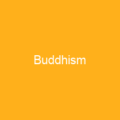The Buddha was a philosopher, mendicant, meditator, spiritual teacher, and religious leader who lived in Ancient India. He taught for around 45 years and built a large following, both monastic and lay. His teachings were compiled by the Buddhist community in the Suttas, which contain his discourses.
About Gautama Buddha in brief

The term is often thought to mean either \”one who has thus gone\” or \”onewho has thus come\”, possibly referring to the transcendental nature of the Buddhist’s spiritual attainment. The Pali Canon also contains numerous other titles and epithets for the Buddha, including: All-seeing, All-transcending sage, Bull among men, The Caravan leader, Dispeller of darkness, The Eye, Foremost of charioteers, Fore most of those that can cross, King of the Dharma, Kinsman of the Sun, Helper of the World, Lion, Lord of the Dhamma, Of excellent wisdom, Radiant One, Torchbearer of mankind, Unsurpassed doctor and surgeon, Victor in battle, and Wielder of power. Later generations composed additional texts, such as systematic treatises known as Abhidharma, biographies, and collections of stories about the Buddha’s past lives known as Jataka tales, and additional discourses. These were passed down in Middle-Indo Aryan dialects through an oral tradition. The Buddha also often refers to himself as Tathāgata ). In the early texts, he was also known by other names and titles, suchas Shakyamuni. In theEarly texts, the Buddha alsooften refers tohim as Titha. He was born into an aristocratic family in the Shakya clan but renounced lay life.
You want to know more about Gautama Buddha?
This page is based on the article Gautama Buddha published in Wikipedia (as of Dec. 10, 2020) and was automatically summarized using artificial intelligence.







